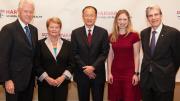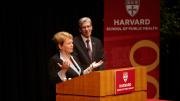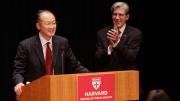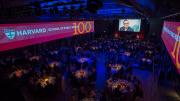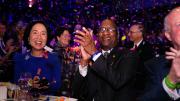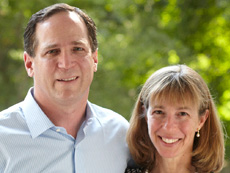Harvard School of Public Health (HSPH) launched its $450-million capital campaign this week, the first school to do so following the unveiling of the $6.5-billion University-wide Harvard Campaign on September 21. The campaign began on the auspicious occasion of the school’s centennial (see “100 Years of HSPH” for more on the past and future of public health) campaign events opened on Thursday, October 24, with the awarding of three Centennial Medals and the inaugural Next Generation Award (recipients included Bill and Chelsea Clinton) and an evening gala that marked the official launch of the campaign. Friday’s schedule includes a presentation by Dean Julio Frenk (see “A Global Health View”) on the “Second Century of HSPH”; faculty members leading small group discussions; a panel of ministerial-level public-health officials from around the globe weighing in on their experiences at the frontlines; and a school-wide celebration.
The campaign comes amid difficult financial times for the school. In fiscal year 2012, HSPH received only 14 percent of its operating revenue from the Harvard endowment, less than any other school. (Endowment distributions contributed 35 percent of revenue for the University as a whole—and 85 percent of the operating revenue of the Radcliffe Institute for Advanced Study, which unveils its capital campaign on Monday.) That same year, HSPH derived about 73 percent of its income from sponsored research, most of that from the National Institutes of Health—but government funding has fallen dramatically in the wake of sequestration budget cuts.
“We are aware that we’re living through very turbulent times, financially,” Frenk said in an earlier interview, “and we need to be prepared for that.” The school has moved to diversify its income: it has created an office of research strategy and development to compete more aggressively for limited federal funding, and has increased its tuition revenue by investing in executive- and continuing-education programs. Nevertheless, a major focus of the campaign is to secure long-term funds to put HSPH on a more solid financial footing.
Campaign Themes and Objectives
Already, $167 million—37 percent of HSPH’s goal—has been pledged or received in quiet-phase contributions. HSPH has received major grants from the Bill and Melinda Gates Foundation, among them $14.1 million to test the “safe childbirth” checklist designed by Atul Gawande, professor in the department of health policy and management (see “The Unlikely Writer”), and $12 million for an initiative on maternal health in developing nations.
Fundraising priorities fall into five broad categories:
Research and innovation funds ($226 million). Slightly more than half the campaign’s total target is intended for research and will be sought primarily in the form of current-use funds; one model is the existing Dean’s Fund for Innovation, a source of unrestricted funding that enables the dean to highlight the research priorities broadly outlined in the four HSPH campaign themes (see “100 Years of HSPH” for more about these themes and their centennial context):
- old and new pandemics—from AIDS and malaria to obesity and heart disease;
- harmful physical and social environments—from respiratory illness and certain cancers to gun violence and suicide;
- poverty and humanitarian crises—preventable injuries and deaths across the globe; and
- failing health systems—impediments to effective, affordable healthcare and preventative health services.
Junior and senior professorships ($64 million). Supplementing the drive for research support, the school also seeks to endow more professorships. Of its current primary professorships, fewer than 40 percent of senior professorships (and just over a quarter of faculty positions overall) are endowed; many untenured faculty members currently cover large portions of their salaries from research grants or through joint appointments with other, nearby Harvard-affiliated hospitals and institutions. (In comparison, two-thirds of tenured professorships are endowed in the Faculty of Arts and Sciences, which unveils its campaign on Saturday.) The school hopes that endowed professorships will enable more researchers to pursue their own intellectual avenues in a tight federal-funding environment, and the current aim is more to support existing faculty members than to significantly expand professorial ranks. The campaign goal is to endow roughly one junior and two full professorships in each of its nine departments; the actual distribution will, of course, depend on donors, but the target, if reached, would increase the total number of endowed professorships by more than half.
Student financial aid ($60 million). Because HSPH’s financial aid relies heavily on endowment income, already trimmed by the recession, the school seeks more funds for student support. Of the approximately $25 million per year the school receives in tuition revenue, $11 million is returned in student aid, not including federal loans, said dean of academic affairs David Hunter in an earlier conversation. He pointed out that aid for international students is particularly difficult to obtain: they are often ineligible for federal training grants. Currently, 65 percent of HSPH students receive some financial aid from Harvard.
Infrastructure ($52 million). For many years, the promise of a move to Allston delayed HSPH infrastructure improvements. But now that current plans place the School of Engineering and Applied Sciences in the new campus, rather than HSPH, “We’re moving forward,” says Frenk. “Because [Allston] is a more distant possibility, we are…investing here.” By all accounts, infrastructure improvements are long overdue, with facilities split among 24 buildings, many aging and in need of maintenance. Technological infrastructure is also a priority, as large-scale computation and big data play an increasing role in research from genetics to biostatistics and epidemiology.
Transforming public-health education ($48 million). HSPH recently completed a centennial curricular review that argued for a competency-based curriculum, with more simulation- and immersion-based learning; major revisions to its degree programs are also in the works, and the school seeks to remodel existing classrooms to accommodate new technologies and pedagogical approaches. A conference on November 1, titled “The Second Century Symposium,” will address these educational innovations in detail. Several recent gifts are focused on education: the school received a $12.5-million gift to sponsor educational innovation from the Charina Endowment Fund and honorary campaign co-chairs Richard L. Menschel, M.B.A. ’59, and his wife, Ronay Menschel, and an anonymous gift of $5 million is already underwriting a new doctorate in public health leadership.
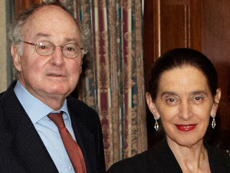
courtesy Richard and Ronay Menschel
Richard and Ronay Menschel
In remarks to donors and alumni Thursday night, Frenk shared an excerpt from a letter he had written to his successor as dean, for a time capsule to be opened in 50 years: “Each generation has one overriding responsibility: to safeguard the legacy it has received from previous generations and hand it enriched to the next one.”
Centennial Medal and Next Generation Award Recipients
Festivities began Thursday afternoon with the presentation of three HSPH Centennial Medals, a one-time award to commemorate the school’s hundredth anniversary, and the inaugural HSPH Next Generation Award, designed to recognize an individual under the age of 40 for their public-health accomplishments.
Dean Frenk called the honorees "role models, who show what can happen when an individual refuses to be satisfied with the status quo and has the vision and the perseverance to change it"—necessary qualifications, he said, for a successful career in public health. He lauded them as “boundary-crossers,” testament to the fact that “real change” requires “moving beyond false divisions, especially the one that separates the world of ideas and the world of action.”
Chelsea Clinton received the Next Generation Award for her work as vice chair of the Bill, Hillary, and Chelsea Clinton Foundation, where she has promoted healthcare access, healthy lifestyles, and disease prevention; she holds an M.P.H. from Columbia's Mailman School of Public Health. A video citation honored her “leadership and commitment to health as a human right, which is inspiring countless young people around the world to make ‘health for all’ a global priority.” In brief remarks, she referred to Frenk’s description of change emerging from “fundamental dissatisfaction”—a feeling she said young people are “disproportionately qualified” to address. “I think we haven’t succumbed yet, in general,” she explained, “to cynicism, or inertia—or patience.”
The three Centennial Medals were given to Gro Harlem Brundtland, M.P.H. ’65, LL.D. ’92; Jim Yong Kim, M.D. ’91, Ph.D. ’93; and former U.S. president Bill Clinton. Brundtland, the former UN Special Envoy on Climate Change, was cited for “promoting the health and well-being of people and of the planet.” She outlined the collaborations between herself and the other recipients, applauding Kim for expanding HIV/AIDS treatment in developing countries as a senior official at the World Health Organization, of which she was director-general from 1998 to 2003. Chelsea Clinton had worked in Brundtland’s office as an intern, and as for the elder Clinton, the former Norwegian prime minister declared, “You were my favorite American president.” (Their tenures as heads of state overlapped through Clinton’s first term.) “We all link together,” she said, a message echoed by the other medalists.
World Bank president Kim was recognized for his “imaginative leadership and dogged determination to improve the lives of millions of people around the world.” Kim, who was a professor at HSPH and Harvard Medical School before serving as president of Dartmouth (2009-2012), offered a message to current students: though they might be advised to pursue narrow, tractable problems for the sake of career stability, he urged them to tackle “the most difficult, seemingly intractable problem you can find.” Kim said he and Kolokotrones University Professor Paul Farmer had done just that as co-founders of Partners in Health, a nonprofit medical organization dedicated to improving healthcare access among the poor, “and what it led to was a kind of creativity out of sheer panic.” At HSPH, he told students, “you have a chance…to combine science with a deep sense of moral responsibility, with an even deeper sense of justice.”
Bill Clinton was honored, with a standing ovation, “for not only his immense impact as president of the United States, but for his continued leadership, dedication, and global efforts, through the Clinton Foundation, to improve the lives of millions of people around the world.” In his 20-minute remarks, he lauded the field of public health as an example of the possibilities inherent when cooperation (pointing to the connections among the honorees that Brundtland had outlined) triumphs over conflict. It is increasingly evident, he said, that “we cannot escape each other—divorce is not an option, either from each other, or from the planet we all inhabit.”
He also spoke of the recent death of Elif Yavuz, Sc.D. ’13, who had worked with his foundation’s Health Access Initiative in Africa; eight months pregnant, she had traveled to Nairobi to deliver her child when she and her partner were shot and killed in the terrorist attack at a shopping mall in September. In the face of such efforts to destabilize society, Clinton said, “The antidote to all the destruction in the world today…is consistent discipline devoted to creating networks of cooperation.” He cited the claim of evolutionary biologist E.O. Wilson, Pellegrino University Professor emeritus (whose work focuses on social insects like ants and bees), that humans, with their capacity for “consciousness and conscience,” could be the world’s “greatest cooperators.” Clinton said that even though the Human Genome Project has shown the overwhelming genetic similarity among all human beings, “virtually all of us spend 99.5 percent of our time thinking about the half a percent of ourselves that’s different.” Pointing to the work of individuals like Farmer, with whom Clinton collaborated to deliver aid following the 2010 earthquake in Haiti, the former president praised HSPH for “elevating our common humanity.” The future, he concluded, will belong to “people who think that what we have in common is more important than our interesting differences.”
Centennial Gala
Birthday wishes, from President Drew Faust and many others, resounded at Thursday evening’s Centennial Gala at the Revere Hotel, which officially kicked off the campaign. Video messages from William (Bill) Gates III ’77, LL.D. ’07, and his wife Melinda Gates, U.S. senator and Gottlieb professor of law emerita Elizabeth Warren, Massachusetts Institute of Technology president Rafael Reif (HSPH opened as the Harvard-MIT School for Health Officers), singer Sir Elton John (he received the HSPH AIDS Initiative Leadership Award on October 15), and others commemorated the school’s centennial and applauded its achievements. A recorded message from U2 lead singer Bono (read his 2001 Class Day speech) started the evening. “Birthdays are a very big deal in our family,” he said, “and this one is a big deal in everyone’s family.”
“It is such a great pleasure to be here,” said Harvard president Drew Faust, taking the podium immediately following his congratulations, “and it’s an even greater pleasure to have Bono be my opening act. I will treasure that.” She congratulated that afternoon’s Centennial Medalists and Next Generation Award recipient:
These individuals are the embodiment of what I’ve come to think of as “rigorous humanitarianism.” Rigorous—evidence-based, knowledge-based, research-based. And humanitarianism—compassion at work to improve the human condition—head and heart joined.
She spoke about the 30-year increase in life expectancy in the twentieth century, of which 25 years are attributed to public health initiatives.
I’m a historian. Historians study change over time. In all of human history, there are few changes as dramatic and as consequential, and as positive as this one. And certainly, it is hard to think of changes of this magnitude that have resulted from explicit human agency and purpose. This instills me with a sense of enormous pride and admiration for the field of public health and for this school’s significant contributions to this achievement.
She ended with a refrain of the speech with which she opened The Harvard Campaign, quoting an alumna’s recollection of legendary crew coach Harry Parker: “It is as if he said to us, ‘This is what you could be. Do you want to be that?’” “This is what we can do,” Faust said to the assembled audience. “Do we want to do that?”
Dean Frenk then spoke movingly of his own path to public health in addressing the “defining choice between caring and indifference.” He recalled trying to decide, in high school, between medicine and anthropology and told of a defining moment during a summer spent in Chiapas, Mexico, working with a famous anthropologist:
Then one day, as I was sitting there observing, in came a very, very poor woman carrying her grandson in her arms. It was very cold—we were way up in the mountains—and she had walked more than three hours to get this sick child to the town’s small health post. While traveling, she had injured her head, so when she arrived, she was completely covered in blood—in need of care for herself as well as her beloved grandchild.
And there was no one.
The person who took care of the health post was not there, and the anthropologist couldn’t do anything to help. And, of course, neither could I. Neither could I. For me, this was the turning point. I remember thinking: I am not only going to study these people. I am going to serve these people.
He concluded on a note of thanks to gala attendees:
You have chosen to care. Beyond that, you have chosen to focus your efforts on science and public health, the most enlightened and lasting ways of making a real difference. Finally, you have chosen Harvard—because it is the best place to invest in research and education to deal with the largest problems of the world. This is the chain of choice that brings you here—now. And this is the chain of choice that will improve health for everyone, everywhere.
courtesy of Jonathan and Jeannie Lavine
Jonathan and Jeannie Lavine
Campaign co-chair Jonathan Lavine, M.B.A. ’92, current managing partner and chief investment officer of Sankaty Advisors, referred in his remarks to the business-school training he shares with his wife, Jeannie (Bachelor) Lavine ’88, M.B.A. ’92 (they have contributed a $5-million gift to create the Lavine Family Humanitarian Studies Initiative); HSPH, he said, has the hallmarks of a good investment, with “an innovative idea that is scalable, that is run by great people, and is really sustainable.” Lavine said the “practical visionaries” at HSPH have ensured that “true to the nature of the school, this campaign is focused not just on a set of internal priorities, but on how the school can make a difference in the world.”
A video outlining campaign priorities concluded by emphasizing this message of public good: “Tonight, this school turns 100, but more importantly, because of the work we do, untold numbers of people will celebrate another birthday.” A song about HSPH, performed by Bono and The Edge, ended the night’s celebration, accompanied by a shower of confetti.
